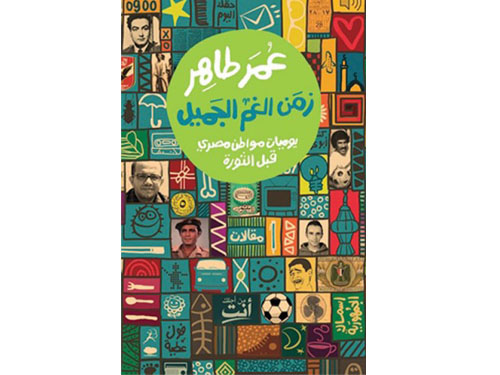
After “The Qasr al-Aini Ambush,” popular writer and journalist Omar Taher continues his revolution-themed book series with a lovely new addition, “Zaman al-Gham al-Gameel” (The Time of Beautiful Melancholy), published by Bloomsbury-Qatar in October.
Through a collection of Taher’s articles, the book compiles the diaries of an Egyptian citizen before the 25 January revolution began; a time when our biggest hope was “the appointment of a vice president or hiring of a minister from the opposition who might later become a national hero,” the author writes in his prelude.
The past two years have been packed with events that spun most Egyptians’ lives around 180 degrees. “Zaman al-Gham al-Gameel” is a reminder of what our daily lives were actually like up until 25 January 2011. Those were times “when soccer was the only source of happiness and inspiration … and when Algeria was our inveterate enemy,” Taher writes.
Like his previous books “Captain Misr” (Captain Egypt) and “Shaklaha Bazet” (It Seems like it won’t Work), “Zaman al-Gham al-Gameel” covers social, religious, economic and political topics that matter to the man in the street, written in the language of the street. For instance, Taher beautifully and brilliantly explains the process of fasting, saying: “A starved, non-functioning body will only function and communicate with the universe through its only working organ … the heart.”
In addition to his appealing and easy to digest writing style, the main selling point of Taher’s latest book is that the diaries are relatable. He preaches to young middle class Egyptians who grew up when the state-run television channels One and Two were the only source of entertainment, those who witnessed the state’s privatization scheme and its ramifications, and who also bought pop singer Amr Diab’s iconic “Mayal” album when it first came out on cassette tape.
Throughout the reading journey, Taher regularly puts a smile on this reviewer’s face through his sharp sense of humor or pleasant nostalgic trips into a carefree past; the time of “Karate [chips], Aly Baba Gum, Bimbo Biscuits and Corona Chocolate,” all Egyptian snack brands that have almost disappeared from the market in favor of more expensive international ones.
In an article titled “October 1966,” he tells the story of Mohamed Fawzi, a renowned singer, composer and founder of the Middle East’s first LP record company. His company was nationalized the same year his “Mustafa” melody sung by Bob Azam became a worldwide sensation. Fawzi was allowed to manage his company from a small room previously allocated to the office boy — a job he refused, instead dying calmly but painfully from a strange illness later called the “Mohamed Fawzi syndrome.” In the same year the record company declared bankruptcy and Azam died in a car accident, writes Taher.
“Zaman al-Gham al-Gameel” is like this old VHS tape collecting dust on your bookshelf — once you play it, a rush of pleasantry hits you, from a magical goal by soccer player Ahmed al-Sakka or a song from your childhood like “Vola vola.”
The book is a perfect remedy for the current moment — a reminder of where we were, and a surge of hope into our tired souls … a highly recommended read.



